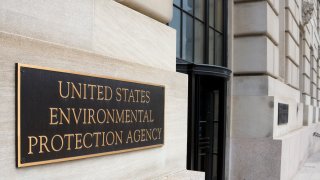
The U.S. military on Tuesday proposed an October start date for a plan to drain a World War II-era fuel tank facility that poisoned 6,000 people when it leaked jet fuel into Pearl Harbor's drinking water 18 months ago.
Fuel from the Red Hill Bulk Fuel Storage Facility leaked into a U.S. Navy drinking water well supplying water to 93,000 people in 2021. The episode poisoned about 6,000 people — mostly military personnel and their families — on and around the Hawaii naval base. It also prompted Honolulu's water utility to shut down nearby wells that provided about 20% of the city's water supply.
After the spill, the state of Hawaii ordered the military to drain and close the tanks. Last year, the military said it expected to remove fuel from Red Hill in July 2024 after it finished repairs to prevent leaks.
The military said it a news release that it would begin removing 104 million gallons (394 million liters) of fuel from the facility on Oct. 16 and finish by Jan. 19.
But that won’t remove all the fuel. The military said it's likely that 100,000 to 400,000 gallons (378,500 to 1.5 million liters) would remain. It said it will propose additional plans to remove the final gallons.
The U.S. Environmental Protection Agency and the Hawaii Department of Health must sign off on the military's new plan.
Kathleen Ho, Hawaii's deputy director of environmental health, said she was encouraged by the new proposal.
"We will carefully review this submission to ensure that the updated timeline and plan can be executed safely without any further risk to the environment,” Ho said in a statement.
The tanks can hold 250 million gallons (1.1 billion liters) of fuel but are at less than half capacity now. Thirteen of the 20 tanks have fuel in them.
A Navy investigation found a cascading series of mistakes, complacency and a lack of professionalism over the course of six months led to the 2021 fuel spill. It has yet to announce disciplinary action in response to the spill.
Get a weekly recap of the latest San Francisco Bay Area housing news. >Sign up for NBC Bay Area’s Housing Deconstructed newsletter.

